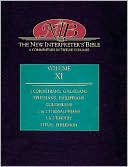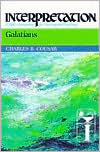Galatians
Most Bible commentaries take us on a one-way trip from the twentieth century to the first century. But they leave us there, assuming that we can somehow make the return journey on our own. In other words, they focus on the original meaning of the passage but don't discuss its contemporary application. The information they offer is valuable but the job is only half done! The NIV Application Commentary Series helps us with both halves of the interpretative task. This new and unique series shows...
Search in google:
Discover not only the original meaning of Galatians, but also how the message of Galatians can speak powerfully today.
Galatians\ \ By Scot Mcknight \ Zondervan\ Copyright © 1995 Zondervan\ All right reserved.\ ISBN: 0-310-48470-7 \ \ \ \ Chapter One\ Galatians 1:1-9\ * * *\ Paul, an apostle-sent not from men nor by man, but by Jesus Christ and God the Father, who raised him from the dead-2 and all the brothers with me,\ To the churches in Galatia:\ 3 Grace and peace to you from God our Father and the Lord Jesus Christ, 4 who gave himself for our sins to rescue us from the present evil age, according to the will of our God and Father, 5 to whom be glory for ever and ever. Amen.\ 6 I am astonished that you are so quickly deserting the one who called you by the grace of Christ and are turning to a different gospel-7 which is really no gospel at all. Evidently some people are throwing you into confusion and are trying to pervert the gospel of Christ. 8 But even if we or an angel from heaven should preach a gospel other than the one we preached to you, let him be eternally condemned! 9 As we have already said, so now I say again: If anybody is preaching to you a gospel other than what you accepted, let him be eternally condemned!\ Original Meaning\ While this letter appears to begin as typical ancient letters began (Writer ... Addressee ... Greetings ...), the careful reader observes not only variations but also the themes that motivate the letter. In general, Paul's introductions are longer, just as his letters are longer than the average ancient letter. Furthermore, Paul's greetings emphasize his own apostolic status (cf. Rom. 1:1; 1 Cor. 1:1; 2 Cor. 1:1; Eph. 1:1) and the divine origin of salvation. More importantly, Paul's introductory greetings are truly introductions: in each of them he begins to express his concerns for the entire letter. In this letter Paul begins to speak of his unquestionable apostleship (v. 1: "sent not from men nor by man" is an early criticism of the status of the Judaizers) and of salvation by grace (1:4); both of these themes, of course, dominate the letter.\ This introduction comprises two sections: (1) the salutation (vv. 1-5) and (2) the occasion of the letter (vv. 6-9). The salutation includes Paul's particular status (v. 1), the addressees (v. 1), those who are with Paul (v. 2), and the greeting of grace and peace (v. 3). Paul greatly expands the greeting by speaking of the true origin of grace and peace (vv. 4-5). The occasion of the letter begins with a statement expressing Paul's befuddlement at the fickleness of the Galatian churches (v. 6). This Paul clarifies in verse 7 when he states that, in fact, the message to which the Galatians were being attracted was not the gospel at all. Paul's convictions are so strong about their departure from the pure gospel that he invokes an eternal curse on those who distort the gospel of Christ that he received and preached to them (vv. 8-9).\ Paul's salutation has some interesting features that we need to examine, including the significance of the title "apostle" (v. 1) and the meaning of "the present evil age" (v. 4). To use the title "apostle" as the second word of the letter is to claim authority and to expect agreement on the part of the churches of Galatia. While our age may be essentially dialogical in its orientation, Paul's world was more hierarchical and authoritarian. To understand this we must sketch what an apostle was in the Jewish and early Christian world. The Greek term for "apostle" (apostolos) is parallel to the Hebrew word shaliach. This Hebrew term was used to describe a personal agent, representative, or ambassador. In fact, a post-first-century definition has become standard for how we understand what an apostle was, even in the first century. I quote from the third-century Jewish Mishnah: "One who prays and errs-it is a bad sign for him. And if he is a communal agent [who prays on behalf of the whole congregation], it is a bad sign for them that appointed him. [This is on the principle that] a man's agent is like [the man] himself" (Mishnah Berakhot 5:5). Notice in this definition that others make inferences about a given authority on the basis of his agents. (The term "agent" is a translation of the Hebrew shaliach.) That is to say, one's agents become the very representations of the person who sent them, much as international ambassadors are official representatives of the national leader himself. With this in mind, we can clearly see that Paul saw himself as an official representative of Jesus Christ. He knew he had been called by Jesus Christ and been appointed an official apostle of Jesus Christ, and he knew the implication of being called an apostle.\ Paul worked this out in several directions. While he knew there was a special class of apostles, the Twelve (cf. 1 Cor. 15:7; Gal. 1:17, 19), he knew he was also an apostle in a parallel sense, even if he was "last of all" (1 Cor. 15:8; cf. Rom 1:1; Gal. 1:1; etc.). While it is clear that Paul at times had to struggle with others over his status (e.g., at Galatia and Corinth), his own convictions were firm. Paul knew he had been called by the risen Jesus (1 Cor. 9:1; 15:7-8; Gal. 1:15-16) and that the Lord had revealed to him in that call the specifics of his ministry: Paul was to go to the Gentiles (Gal. 1:16; 2:7). This call was confirmed in Paul's missionary successes and in his miracles (cf. Rom. 1:5; 11:13-16; 15:19; 1 Cor 3:5-6; 4:15). In fact, Paul tells the Corinthians: "you are the seal of my apostleship" (1 Cor. 9:2). We should also observe that Paul, along with the testimony of the church, saw the role of the apostles to be a special one in history; he knew that they performed a crucial function in the period just after the resurrection of Christ (1 Cor. 4:9; Eph. 2:20; 3:5-6; Col. 1:24-27).\ Paul, then, writes as an apostle-as one who has been called personally by Jesus Christ, who therefore represents Jesus Christ, and who has a crucial role in the history of the church. He claims at least that much in the second word of this letter. He expects the Galatians to listen; he knows that disagreement is no longer dialogue; disagreement is heresy when it comes to the essentials of the gospel as made known through the apostles and prophets. Even Paul himself must submit to his own gospel (1:8, 10).\ Paul's greeting is the typical early Christian mixing of the Greek and Jewish greetings ("grace and peace"). However, Paul's greeting is not simply from one mortal person to another; the grace and peace Paul invokes upon the Galatians is the grace and peace "from God our Father and the Lord Jesus Christ." Paul, in adding the origins of his greetings, distances his greetings from the secular world and makes them sacred and religious. This greeting is one shared only by Christians.\ In describing the origin of the greetings, Paul goes on to comment on Jesus, saying that Jesus Christ "gave himself for our sins to rescue us from the present evil age" (v. 4). Forgiveness of sins is important for Galatians but it plays a mediating role there. For this letter forgiveness implies that work of Christ is sufficient (2:21). To bring up forgiveness, then, implies that the Galatians have not yet grappled enough with how potent the work of Christ was. To put this another way, while the Galatians may have thought they were forgiven by Christ (2:15-21; 3:10-14), they did not realize that this forgiveness was also sufficient to rescue them from "the present evil age." It was the present evil age that concerned Paul because he believed that those who consistently lived in Christ would not succumb to it.\ What is "the present evil age" from which one is rescued through the cross (cf. 3:13)? How is one rescued from a "time period"? While it may be correct to say that in comparison, the present for Paul is evil and the future is good (cf. 2 Cor. 5:1-10), this is not nuanced enough for what Paul is getting at. Judaism frequently distinguished "this age" from the "age to come," the latter a description of the establishment of God's justice and peace. But the revolution that took place in Paul's understanding of history when he encountered Jesus Christ adds a new dimension to "this age." It is probably best to regard this expression as describing "life dictated by the law." Because Christ has eclipsed the age of the law and brought history to a new era (see notes at 3:19-25), life under the law, whether lived now or in the past, is considered "an evil age" (cf. 4:3, 9; 5:1; see also 5:16-26). One who trusts in Christ is rescued from the present evil age: "he gave himself for our sins to rescue us" (1:4). This expression, then, probably reflects the polemical situation of Galatians: the present evil age is the age in which the Galatians are being seduced to live, and life in Christ is a life of freedom (5:1-12).\ Paul's introduction moves next to a description of the occasion for the letter (vv. 6-9). It has often been observed that this is the only surviving letter of Paul's that does not contain a thanksgiving for the church to whom he is writing. It is then usually inferred that since Paul does not give thanks, he is either not thankful to God for them or he is so angry with what has taken place he cannot express his thanks. These observations, in some form, are probably accurate. However, we should also observe that many hold this letter to be the first canonical letter Paul wrote and that, in light of this, it is hard to argue a departure from his typical practice since that practice had not yet begun. It is just possible that Paul's practice of expressing thanksgiving in his letters developed later or that such a practice developed out of his harsh experience at Galatia.\ The reason why Paul wrote this letter, and the reason we have it, is because the Galatians had "changed positions" on a crucial subject: the means of acceptance with God and the role Christ played in that acceptance. Paul is amazed that their change took place "so quickly" (v. 6). At 5:4 Paul states that this change was opting for a system in which grace was not crucial and in which Christ's work was not sufficient. Paul states here that they were "deserting the one who called you" (v. 6); that is to say, their move was not just an intellectual one. Rather, it was a desertion of God as made known in Christ; it was abandoning of their personal relationship with God. If we use the categories of 3:19-25 (see notes there), their departure was a decision to live in B.C. days when the A.D. days had arrived. It was a decision to recede back in time into the days of Moses and to reject the epoch-altering revelation in Christ. While Paul suggests this was a move to a "different gospel," he goes on in verse 7 to clarify this by saying that this is "really no gospel at all." The move of the Galatians was not one of those views of legitimate Christian differences; it was total and devastating. Paul counters here any suggestion of simple Christian differences. When the gospel of grace in Christ is supplemented with the system of Moses, the result is not a perfected, fully mature gospel; rather, it is a gross perversion and a totally different message.\ Gross perversions of the gospel are heresies. Paul's final words here are potent. He invokes a curse on anyone (including himself!) who distorts the gospel. Paul's sentences in verses 8-9 are largely parallel and synonymous with one interesting variation. The expression "the one we preached to you" in verse 8 has its parallel in verse 9 in "than what you accepted." The latter expression is related to his apostolic calling. Paul uses here the technical language of passing on sacred traditions ("what you accepted"; Gk. parelabete) in such a way as to guarantee authenticity and heredity. It is the same language used by rabbis for handing on their sacred traditions, and it is the same term Paul uses for the tradition of the Lord's Supper (1 Cor. 11:23). The message Paul preached is the message that ultimately derives from the Lord because it is has been transmitted to others through his apostles.\ Those who distort this message are rejecting the authority of Christ and are therefore cursed (anathema). This word is used in the Old Testament for something consecrated to God for his destruction (cf. Deut. 7:26; Josh. 6:17-18). Paul is not talking here about church discipline; his language is far too strong for that. He is invoking God's final damnation and wrath on people who distort the gospel of grace in Christ and substitute, in effect, Moses' law as the preeminent form of revelation. They are like those who reject the message of the prophets (1 Kings 11:30-31) or apostles (Matt. 10:14).\ Paul's introduction encompasses much: it moves from wishing God's grace and peace on believers to cursing those who refuse that grace; it moves from Paul's titled status (apostle) to the severest form of that status (cursing). It introduces us to the heart of the Galatian problem: a gospel of grace at war with a gospel that minimizes Christ.\ Bridging Contexts\ Any bible reader knows that reflection and meditation upon even the smallest of words and sentences of God's Word can produce applications for life. Because of the scope of this commentary we cannot suggest applications for everything Paul says in these first nine verses. We have to examine the land and find the more significant contours. This is usually done by finding the more logically important words, the most theologically significant ideas, and the more practically relevant issues. Even then we will omit some important things. For example, the resurrection of Christ is crucial both for Christian life and for apologetics. Paul mentions the resurrection in verse 1, but the resurrection does not play a critical role in the theology of Galatians. Since this is not a word-by-word commentary, we will not be able to trace out the applications of every expression. In this particular section (1:1-9), we point out three elements of "bridging the context."\ (1) It is clear to any reader of this letter that Paul faced different problems than we face. He was a Diaspora Jew, probably raised in Jerusalem, and he encountered traveling missionaries who distorted the apostolic gospel of Christ by adding Moses to it in such a way so as to make life in Jerusalem (and elsewhere) more socially comfortable. I have rarely heard of Christians converting to Judaism in such a way that they thought they were bringing Christianity to its fullest form. I have heard, sadly, of some who have rejected Christ and opted for Judaism (or some other faith). Put differently, when we apply even this introduction, we must be aware of the differences as well as the similarities. We must be aware of the social context of the Judaizers as a potential clue for application. Perhaps we will find groups of Christians who are deeply influenced by leaders who themselves are seeking acceptance with some social group.\ \ Continues...\ \ \ \ Excerpted from Galatians by Scot Mcknight Copyright © 1995 by Zondervan. Excerpted by permission.\ All rights reserved. No part of this excerpt may be reproduced or reprinted without permission in writing from the publisher.\ Excerpts are provided by Dial-A-Book Inc. solely for the personal use of visitors to this web site. \ \
http://zondervan.com/media/samples/pdf/0310484707_samptoc.pdf







